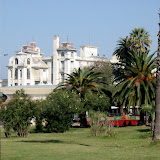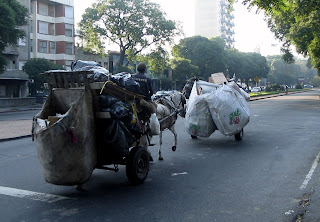Such a phrase is not hard to come by down here while surfing the internet. None of that "Click here to claim your prize!" In a country that feels something between pity and ire towards the hard worker, it's odd to see an advertisement encouraging work. I'll save a few of my other peculiar observations for later. I'm trying to include pictures now, excuse any formatting irregularities. Onto more important things.


Classes. Since I also have an internship and Middlebury's "Cuaderno," a course that consists of keeping a blog in Spanish and doing a cultural project, I'm only supposed to take two classes that both meet six hours a week, which are 20th century History of Uruguay and an interdisciplinary course with the official name "Around the socio-political history of the Southern Cone of Latin America and Uruguay: Democratic crises, dictatorships and transition processes. Interdisciplinary focuses." I suppose instead of a class description below the title they prefer a descriptive title. Needless to say, the classes started off with a bang and I was really excited for them. Uruguay seemed to have an interesting history full of dictatorships, social and economic reforms/movements, etc. and the dictatorship class was covering interesting revolutions and political turmoil in Chile and Argentina, the latter which is a roller coaster ride of coups, "elections," left and right political movements, and oppressive dictatorships from WWII until the mid 80s. Albeit a brutal three hours, classes were small, teachers and reading were good, and there was a lot of class discussion (most of which I didn't understand). I could usually follow the teachers, but when students spoke up, forget about it. For being such a chilled out country, people (in particular the youth) feel compelled to talk as quickly as possible and enunciate as little as possible.
Picture break of the economic union Mercosur (Common Market of the South), where I began an internship about a month ago, and "Espacio Libre Bob Marley" which sits across the street from my house.


Classes are certainly different now. First, to say that having only three hour classes is brutal is
an understatement. The good readings for the most part stopped being assigned, and have been replaced by bibliographies with 30-40 books that are "recommended" to supplement the course. My ass that the professors have read all the books on the list. One of Ruby's classes has a 25 page bibliography. Worse is the class format. Words like "organization," "conscise" or "lesson plan" don't exist here. The professor shows up with the intention of talking most of the time and letting the students chime in when they want. One of our professors could condense his three hour classes into five or ten minutes with ease. Another class we spent three hours summarizing four assigned readings. Never mind analyzing the articles, sharing opinions or using them as a starting point for a discussion, these were just synopses. One student spent literally over an hour summarizing the article he was presenting. My dictatorship class has a good ten professors listed, and while the first two were good, the last two have excelled at talking in circles, going down tangents, talking about nothing and then repeating it all over again. The main teacher of my Uruguayan history class looks like a more grizzled Richard Gere who just reads for three hours from the notes he wrote the first time he taught the class. Let's just say it has certainly been a different academic experience from Middlebury. Next semester I'll be in a private university that follows the U.S. model...so they say.
 Although classes have become less than stimulating, other facets of life have continued to get better and better. Friendships continue to get stronger with Uruguayans, and I've definitely noticed my Spanish improving a lot. Just two weeks ago I had a good talk with Jeremy about how I didn't feel like my Spanish was improving, and decided I needed to make more of an effort to engage Uruguayans in conversation as much as possible. I think largely what happens is the change is gradual, but I feel like redoubling my efforts to talk and listen to more Spanish more has helped too. While there is no campus for the university (each "school" i.e. humanities, social sciences, engineering, etc. is located in a different part of town, meaning my campus consists of this one building above), I've spent more time hanging out around the cafeteria where classmates can frequently be found studying, drinking mate or grabbing lunch. Mauricio, a friend from class, talks so fast it used to sound more like he was the world's fastest gargler than speaking a language. Now it still sometimes sounds like he's speaking with a bar of soap in his mouth, but I can usually follow most of what he says. Some students in class used to impress me because they would talk very dynamically and clearly for ten minutes or more in a discussion, but now that I can usually understand them most of what they say seems to have very little to do with the class and at best, would be better left out of the discussion.
Although classes have become less than stimulating, other facets of life have continued to get better and better. Friendships continue to get stronger with Uruguayans, and I've definitely noticed my Spanish improving a lot. Just two weeks ago I had a good talk with Jeremy about how I didn't feel like my Spanish was improving, and decided I needed to make more of an effort to engage Uruguayans in conversation as much as possible. I think largely what happens is the change is gradual, but I feel like redoubling my efforts to talk and listen to more Spanish more has helped too. While there is no campus for the university (each "school" i.e. humanities, social sciences, engineering, etc. is located in a different part of town, meaning my campus consists of this one building above), I've spent more time hanging out around the cafeteria where classmates can frequently be found studying, drinking mate or grabbing lunch. Mauricio, a friend from class, talks so fast it used to sound more like he was the world's fastest gargler than speaking a language. Now it still sometimes sounds like he's speaking with a bar of soap in his mouth, but I can usually follow most of what he says. Some students in class used to impress me because they would talk very dynamically and clearly for ten minutes or more in a discussion, but now that I can usually understand them most of what they say seems to have very little to do with the class and at best, would be better left out of the discussion.
Smoke from Buenos Aires 400 kilometers away and a couch hanging out in a plaza...weird things happen down here.


Despite my occasional sarcasm, Uruguay is an amazing country. There really is no other country like it to compare it to, and for such a small country, it has its own unique flavor. Not only are people nicer here than anywhere else I´ve been in Latin America, I also love discovering new oddities every day about this country, such as that the country went to the trouble of declaring it illegal to drink mate while riding the bus or driving (probably for the better).
Lastly, a few things I've learned down here from Uruguayans or just observed in general:
- Water is bad for you
- Oil does not have fat in it
- If you sleep without socks on you'll get sick
- If you don't drink enough whiskey you'll get sick
- The Chinese are dirty (not a general observation. All the Chinese I've met—Chinese here usually means from east Asia—have been very nice and one "Chinese" person from Taiwan invited me to drink tea at his house sometime)
- Fanny packs are in- leather, denim, corduroy...just about any fabric
- If you have a sweater and don't want to wear it, the stylish thing to do is tie the sleeves around the front of your neck and let it hang behind you...something of an improvised scarf
And some tasty new dishes...
- Some type of pastry stuffed with tuna, mayonnaise and ketchup, left to ferment on the kitchen counter for 10 to 12 hours. I gagged before the first bite was down. The rest went straight to the dumpster outside since I wanted to sleep and not spend the night offering my dinner to the Porcelain God.
- Chicken, rice, peas, carrots and a bag of mayonnaise (mayonnaise is quite the popular cuisine down here, sometimes when I'm offered it my response is "why?" for example, if I'm having eggs for breakfast.
- The best way to make coffee is to leave the grinds in the coffee to brew for several hours, chill it overnight, and heat it up in the microwave the next day.
- Re-deep fried vegetables. To give you some perspective, these make tempura taste and look like steamed vegetables. If you want to try it, saturate a sponge in oil and take a bite. Those... vegetables, along with milanesa (fried chicken) and hard boiled eggs was dinner one night. Talk about throwing a curve ball to your digestive system.
On that note I'll leave you with this picture of Montevideo's self employed recycling service:
















